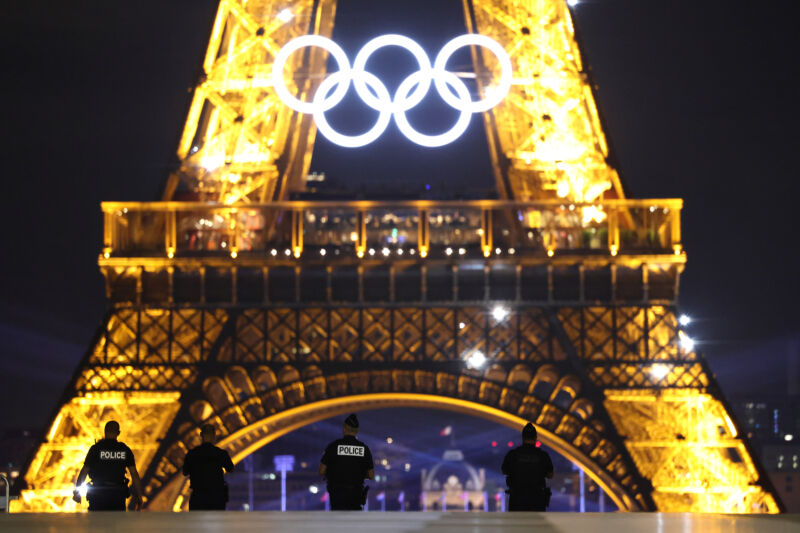
On the eve of the Olympics opening ceremony, Paris is a city swamped in security. Forty thousand barriers divide the French capital. Packs of police officers wearing stab vests patrol pretty, cobbled streets. The river Seine is out of bounds to anyone who has not already been vetted and issued a personal QR code. Khaki-clad soldiers, present since the 2015 terrorist attacks, linger near a canal-side boulangerie, wearing berets and clutching large guns to their chests.
French interior minister Gérald Darmanin has spent the past week justifying these measures as vigilance—not overkill. France is facing the “biggest security challenge any country has ever had to organize in a time of peace,” he told reporters on Tuesday. In an interview with weekly newspaper Le Journal du Dimanche, he explained that “potentially dangerous individuals” have been caught applying to work or volunteer at the Olympics, including 257 radical Islamists, 181 members of the far left, and 95 from the far right. Yesterday, he told French news broadcaster BFM that a Russian citizen had been arrested on suspicion of plotting “large scale” acts of “destabilization” during the Games.

Parisians are still grumbling about road closures and bike lanes that abruptly end without warning, while human rights groups are denouncing “unacceptable risks to fundamental rights.” For the Games, this is nothing new. Complaints about dystopian security are almost an Olympics tradition. Previous iterations have been characterized as Lockdown London, Fortress Tokyo, and the “arms race” in Rio. This time, it is the least-visible security measures that have emerged as some of the most controversial. Security measures in Paris have been turbocharged by a new type of AI, as the city enables controversial algorithms to crawl CCTV footage of transport stations looking for threats. The system was first tested in Paris back in March at two Depeche Mode concerts.
For critics and supporters alike, algorithmic oversight of CCTV footage offers a glimpse of the security systems of the future, where there is simply too much surveillance footage for human operators to physically watch. “The software is an extension of the police,” says Noémie Levain, a member of the activist group La Quadrature du Net, which opposes AI surveillance. “It’s the eyes of the police multiplied.”
Near the entrance of the Porte de Pantin metro station, surveillance cameras are bolted to the ceiling, encased in an easily overlooked gray metal box. A small sign is pinned to the wall above the bin, informing anyone willing to stop and read that they are part of a “video surveillance analysis experiment.” The company which runs the Paris metro RATP “is likely” to use “automated analysis in real time” of the CCTV images “in which you can appear,” the sign explains to the oblivious passengers rushing past. The experiment, it says, runs until March 2025.
Porte de Pantin is on the edge of the park La Villette, home to the Olympics’ Park of Nations, where fans can eat or drink in pavilions dedicated to 15 different countries. The Metro stop is also one of 46 train and metro stations where the CCTV algorithms will be deployed during the Olympics, according to an announcement by the Prefecture du Paris, a unit of the interior ministry. City representatives did not reply to WIRED’s questions on whether there are plans to use AI surveillance outside the transport network. Under a March 2023 law, algorithms are allowed to search CCTV footage in real-time for eight “events,” including crowd surges, abnormally large groups of people, abandoned objects, weapons, or a person falling to the ground.
“What we’re doing is transforming CCTV cameras into a powerful monitoring tool,” says Matthias Houllier, cofounder of Wintics, one of four French companies that won contracts to have their algorithms deployed at the Olympics. “With thousands of cameras, it’s impossible for police officers [to react to every camera].”
